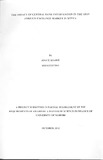| dc.contributor.author | Kiarie, Joyce | |
| dc.date.accessioned | 2013-03-19T05:06:59Z | |
| dc.date.issued | 2012-10 | |
| dc.identifier.uri | http://erepository.uonbi.ac.ke:8080/xmlui/handle/123456789/14522 | |
| dc.description.abstract | Intervention is a very crucial policy tool that central banks uses to correct any short term
exchange rate misalignments and to dampen excessive short-term volatility in the
exchange rate and other disorderly market conditions. However, it could put the banks
credibility and the scarce foreign exchange reserves at risk if poorly adopted. Despite the
prevalence of intervention in developing markets, empirical research on its impact is
limited. In spite of the importance and frequency of intervention in the foreign exchange
markets of Kenya and other developing countries with floating exchange rate regimes
who have experienced very rapid and sharp short-term volatility of their domestic
currency, relatively little empirical work has measured its effectiveness and also there has
been very little research on factors that determine the magnitude of intervention.
The general objective of the study was to investigate the impact of central bank
intervention in the spot foreign exchange market in Kenya. The event is what the
researcher studied. The population under study comprised the number of years that CBK
has at least been in the market intervening in the spot foreign exchange market since
Kenya adopted the floating foreign exchange regime i.e. 1993 to 2012.
The study found that the Forex Markets Reacts both positively and negatively to Central
Bank Intervention announcement. It was found that there was an increase in volumes of
Forex traded before Central Bank Intervention announcement which reduced after Central
Bank Intervention announcement as compared to those before the Central Bank
Intervention announcement. This study found that there were positive mean returns with
respect to Central Bank Intervention announcement; this was in agreement with the
signaling hypothesis.
The study found that direct currency intervention by central bank is conducted by the
monetary authority which aims at influencing exchange rate. Indirect currency
intervention is a policy that influences the exchange rate indirectly these includes capital
controls (taxes or restrictions on international transactions in assets), and exchange
controls (the restriction of trade in currencies, these policies lead to inefficiencies or
reduce market confidence, but can be used as an emergency damage control | en |
| dc.language.iso | en | en |
| dc.publisher | University of Nairobi | en |
| dc.subject | impact | en |
| dc.subject | central bank intervention | en |
| dc.subject | spot | en |
| dc.subject | foreign exchange market | en |
| dc.subject | kenya | en |
| dc.title | The impact of central Bank intervention in the spot foreign exchange market in Kenya | en |
| dc.type | Thesis | en |
| local.publisher | School Of Business, University Of Nairobi | en |

